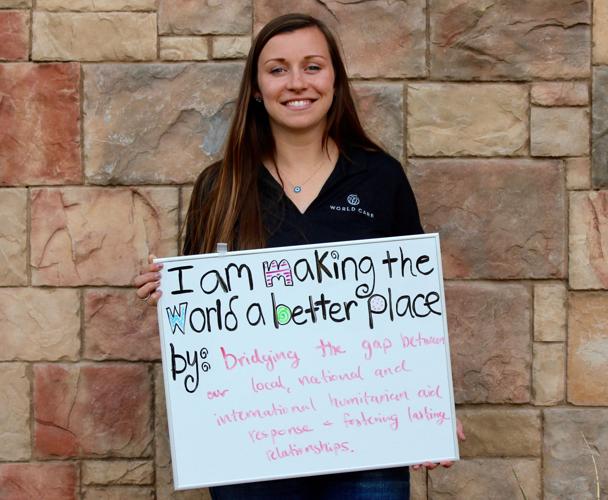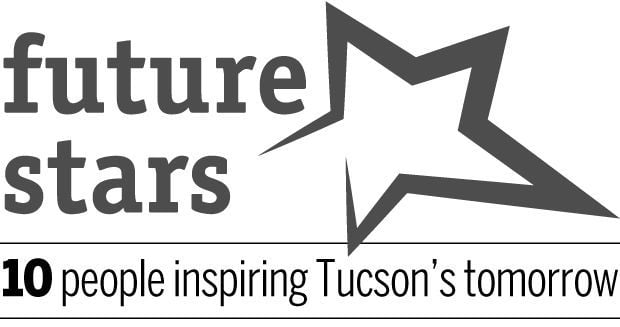When Courtney Slanaker, 24, began volunteering at World Care as a Salpointe Catholic High student, she didnтt expect she would one day lead the nonprofit.
Lisa Hopper, the previous CEO and founder of World Care, watched as Slanaker started as a volunteer, returned as an intern and progressed to employee.
She liked what she saw.
тIt was during one of the disaster events when we were collecting supplies, and she ran with it,т Hopper says. тShe made her own connections and got the resources needed to make the events possible. тІ That was a turning point. Disaster relief is difficult. You have to be fast at it. You have to know how to reach out to people and get people excited about being part of the solution and not part of the problem. тІ I had never met anybody who had all of those elements until I met Courtney.т
People are also reading…
Hopper founded World Care to recycle and reuse school supplies for low income communities locally and abroad. The agency became a nonprofit in 1996 and has grown to recycle electronics and health supplies and provide emergency essentials during disasters.
тItтs always hard to step away from what youтve built, but you have to know when to leave, too,т says Hopper, who is now an adjunct lecturer at the University of УлшжжБВЅ teaching courses on social entrepreneurship and humanitarian aid from a global perspective. тYou have to know when the next generation can take over.т
The day Hopper called Slanaker into her office, the younger woman thought it was all over.
тI thought, тOh my gosh,т Iтm going to get fired right now,т Slanaker says.
Instead, Hopper told her she wanted to pass the agency down to Slanaker, to make her its leader.
Slanaker took over as executive director in October 2015.
Her first brush with World Care came in 2008 or 2009 when a Salpointe social justice class required her to volunteer at an agency of her choice.
She found World Care and spent a summer managing the agencyтs thrift store.
тI loved World Care and the whole idea of it but went to college and forgot about it,т she says.
At the University of УлшжжБВЅ, Slanaker studied public health and abroad in Guatemala, working at a health-care clinic that served communities around Antigua.
On that trip, Slanaker realized she wanted to work in the nonprofit sphere.
тOn my first day of the job, they thought I was a nurse тІ and that was a great disappointment to them when I told them I had no skills,т Slanaker says.
тI was so discouraged and came back the next week and said, тListen. I know Iтm not what you want, but I can learn тІ I can mop the floors, whatever you need to help this clinic run.тт
Eventually, she learned to take vital signs and administer vaccines. Her Spanish improved.
тAfter seeing these conditions people were living in and so much need in the world, thatтs kind of what cemented it,т Slanaker says of her desire to work in the nonprofit sphere. тThe people there make you realize how spoiled you are, and theyтre so much happier, too, even though they have so much less.т
Upon returning to УлшжжБВЅ, her degree required another internship. Again, she stumbled upon World Care.
From there, she graduated into a contracted position and then became a project coordinator, working her way through the agency.
Slanaker says about 80 percent of the supplies collected go toward local needs. The rest are shipped nationally and internationally. Slanaker still takes school supplies and other necessities on frequent trips to Guatemala, continuing a tradition started by Hopper, who was inspired to start World Care after her own medical assessment trip to Guatemala more than 20 years ago.
Slanaker also spends part of the year in Washington, D.C., where her boyfriend lives.
World Care has sparked in her a passion for recycling and environmental care.
тThere is so much excess supply being wasted here, why donтt we find a way to re-purpose it?т she says, pointing to how the agency refurbishes old computers for relocated refugees or collects excess hygiene supplies for low-income families.
Slanakerтs love of international travel shapes her vision for World Care. As a teenager, she accompanied her father on business trips around the world and later spent time in Thailand doing health education in schools.
тI would really like to bridge the gap between local, national and international levels of aid,т she says. тRight now it seems like a pretty segmented system, and a lot of people donтt realize how we locally in УлшжжБВЅ affect people in Guatemala and vice versa тІ If there is not a big, obvious need or disaster, people donтt realize need is still there тІ The only time many people want to respond or donate is when there is a huge catastrophic disaster, and yes, it is critical to send supply ... but we should be helping these people before, too.т
















